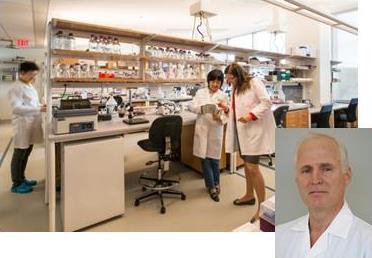 Supporting translation of basic science breakthroughs into medicines to treat human disease
Supporting translation of basic science breakthroughs into medicines to treat human disease
Valley Foundation backs build-out of laboratory studying role of stem cell injury as a cause of complications of common diseases
Posted: March 2014
When scientists at UMass Chan Medical School discovered that a condition such as type 2 diabetes or high cholesterol levels generate systemic oxidant stress (free radical injury) and injure stem cells, it was a notable breakthrough—one that could greatly expand the concept of stem cell therapy for complications of these types of common diseases.
The discovery showed that injury to hematopoietic stem cells, which regulate immunity and inflammation, impaired the ability of these stem cells to perform two very important tasks. One is to develop into specific types of lymphocytes that are able to recognize and kill cancer cells as they develop in the body; the other is to develop into monocytes, which are central to the body’s response to healing and infection.
“Our findings showed that injury to these stem cells significantly increased the risk of colon cancer in pre-clinical mouse models,” said Louis Messina, MD, professor of surgery, who heads the Stem Cell and Regenerative Medicine Program in the Advanced Biotherapeutics Center at UMMS. “It also accounted for the impaired wound healing of type 2 diabetic mice.” Impaired wound healing and infection are the most common reasons for diabetics to be admitted to the hospital.
Housed in the Albert Sherman Center, which opened in January 2013, the Stem Cell and Regenerative Medicine Program was established around the promise that lies within the application of using human stem cells for regenerative therapeutics. That promise is being supported by the Wayne and Gladys Valley Foundation, which made a gift of $4.6 million to fund Dr. Messina’s research space—bringing the foundation’s historic support of the academic health sciences system to more than $17 million.
The basic research of the Stem Cell and Regenerative Medicine Program focuses on the cellular, molecular and biochemical composition of pluripotent cells and how they can be manipulated to understand disease mechanisms as well as provide the basis for novel dimensions to treatment. By collaborating with the RNA Therapeutics Institute and the Gene Therapy Center—also part of the Advanced Biotherapeutics Center—the program anticipates developing translational research programs for cancer, type 1 and 2 diabetes, Alzheimer’s, Parkinson’s and other diseases.
“Our program connects leading basic scientists and clinical scientists who study stem cell biology with leading physician scientists from across multiple disciplines who, together, will apply their knowledge in clinical trials to establish new treatment models,” said Dr. Messina. “The support of the Valley Foundation in creating the space in which we will conduct this work is invaluable, as it will also accelerate our ability to recruit additional key scientists required for this important research.”
Story published in the 2013 Annual Report of Donors (pdf).

